Online Courses
The 13 Best Kajabi Alternatives of 2025
We've talked to thousands of creators. The best alternative to Kajabi depends on your goals, but it's on this list.
Author
Mighty Team
Last Updated
September 18, 2025

There's no doubt Kajabi was the OG of course platforms. A decade ago.
But today, creators who build on Kajabi often find out the hard way. It's expensive. It's outdated. And while its async course platform is still its best feature, it's missing modern course features like native livestreaming and integrated community, and you need 3 different Kajabi apps to run the average course business!
No wonder creators are looking for a Kajabi alternative.
In this article, we'll cover:
What Kajabi is
What Kajabi does well
Disadvantages of Kajabi
What to look for in an alternative
The best Kajabi alternatives on the market
Try the platform with the most $1 million courses and communities--free for 14 days!
What is Kajabi?
It's an online course and marketing platform. Kenny Rueter created it in 2010. He wanted to sell a lawn sprinkler he'd created for his son. But he couldn't find the digital sales infrastructure he liked. Today, Kajabi is a well-known online course platform. Importantly, it's self-hosted; it's part of a movement of hosted course platforms that let creators own their work (unlike a course marketplace).
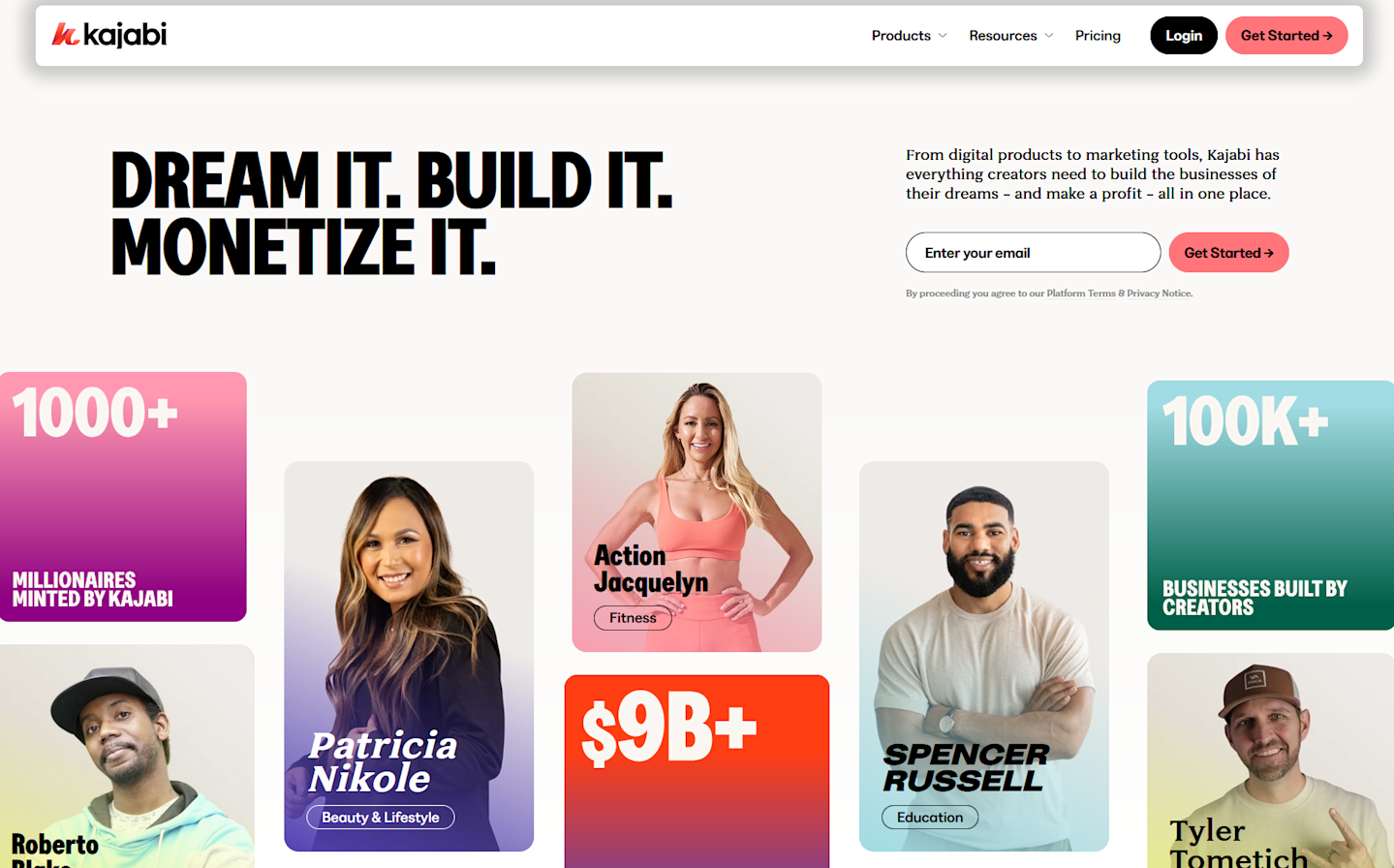
These are the features that helped Kajabi gain popularity in the creator economy.
But Kajabi is expensive. And there are tons of course platforms innovating and changing how we think about online courses. For most course creators there are better options.
These are the top 5 alternatives to Kajabi
TLDR; These are the top 5 alternatives to Kajabi. Scroll down for in-depth analysis + more options.
Mighty Networks: For more engaging live or async courses on G2's top-rated community platform. Try it free.
Mighty Pro: For courses on a way better branded app than Kajabi has. Get a free demo.
LearnWorlds: For a better async course builder with SCORM compliance.
Maven: For a course marketplace built around live, cohort courses.
ClickFunnels: For higher-performing course marketing funnels.

13 Alternatives to Kajabi (Reference Chart)
This chart is a reference for all the Kajabi alternatives we talk about in this post. Click on an option for more in-depth analysis.
Best Features | Use For | Starting From | |
|---|---|---|---|
Live & async courses built for engagement | Courses w/ community | $49/mo | |
Custom branded apps | Branded courses apps | Learn More | |
Page building & async courses | Async courses | $24/mo + $5/sale | |
Marketplace cohort learning | Interactive cohort courses | Revenue share | |
Pre-made funnels & landing pages | Selling digital, physical & online products | $127/mo | |
Large marketplace w/ easy course building | Maximum course reach | Udemy takes up to 67% | |
Marketing, evals., & WordPress plugin | Async courses w/ WordPress | $49/mo | |
Website building & AI Tools | Async courses w/ websites | $59/mo + 5% Fees | |
Large audience of creators | Exposure to creative fields | Partial revenue pay by watch time | |
WordPress courses w/ Gutenberg feel | WordPress courses | $199/yr | |
White-label LMS | Completely branded courses | Varies | |
College & professional courses w/ certs. | Courses w/ official certifications | Varied payouts | |
Website builder w/ email marketing | Complex course websites | $39/mo + 5% Fees |
Kajabi pros and cons
Advantages of Kajabi
Look, there are successful creators on Kajabi. People making millions a year. It’s a stable, savvy platform for certain kinds of courses.
Here's what it does best:
Pre-recorded course. Build-it-and-leave-it courses (AKA asynchronous courses) have been Kajabi's bread and butter. The LMS works well; it drips material, adds photos and videos, plus questions.
Market with funnels. Pre-made funnels to run sales and promotions, email with customer tags, and up- and down-sells.
Build a course website. Lots of templates, drag-and-drop customization, and AI course material.
Sell memberships and subscriptions, charge a one-time fee, or bundle your digital products for sale in multiple currencies.
Disadvantages of Kajabi
The course landscape is changing fast. And Kajabi hasn't kept up.
It fails at live engagement. Kajabi's course platform has no livestreaming, no dynamic content, and not even native video hosting.
It isn't built for live courses. Some course platforms have native livestreaming, but Kajabi doesn't. And embedding a YouTube stream link into a course is not a live course. There's livestreaming in Kajabi Community 2.0, but that comes with its own set of problems.
It's hard to add a course community. Kajabi recently added "Community 2.0" (an improvement on its previous forum). With some community platform features, users still need a separate log-on and separate app to access it. Kajabi fails at course and community integration.
You need two different apps. Kajabi has 2 different apps for its courses and community; that's 2 log-ons and 2 downloads if you want both.
Ask these questions to find the right alternative
How important is live teaching, events, and engagement?
Should I have a branded app? (for established brands, native apps create better engagement).
Do I need funnels? High-pressure sales tactics and fake timers SUCK. Real digital businesses are built on trust, not FOMO.
Can I do everything in one place? Mixing platforms and solutions adds complexity and kills engagement.
What integrations do I need? (if any) Kajabi has some integrations. If you need one, make sure your alternative has it. Watch for native and built-in integrations where possible.
The 13 best Kajabi alternatives
Whether you’re simply looking for a different course platform than Kajabi, you want an online marketplace, or you’re ready to bring your online courses and community together in the same place under your own brand, you have options.
Here's our ranking and analysis of the best Kajabi alternatives.
1. Mighty Networks
Best Kajabi alternative
Mighty Networks is the ultimate course and community software that you can use for:
Async courses: Record your material in advance and host it on a powerful LMS that gives creators flexible options to teach async and/or live courses.
Live courses: Use native livestreaming and engagement tools to pre-sell and teach a cohort course.
Building course communities: Your course lives in G2's top-rated community management software.
Teaching live and selling the recording: Why choose from a live or pre-recorded course when you could do both?
Only Mighty lets you host videos and content for passive income—and charge a premium for live course experiences.
Unlike Kajabi, everything happens on a single platform with engagement built through it: add private Spaces, live events, discussion forums, member profiles, video and written content, and more!

What makes Mighty the best Kajabi alternative:
Native course features Kajabi doesn't have: native live streaming, integrated course events with RSVP, vibrant community functions, and branded subgroups.
More ways to monetize: Charge for live or pre-recorded courses, sell community or private Spaces, events, coaching communities, masterminds, or bundle ANYTHING together.
Better AI tools: Mighty Co-Host™ has Kajabi's AI tools--AKA course outlines, landing pages, and writing prompts. But Mighty's approach to AI goes further, and it's made to boost engagement and human connection. People magic turns strangers into friends, starts discussions, helps members meet each other, and puts your community growth on auto-pilot.
Grow into branded apps. Unlike Kajabi, Mighty only ever needs one app. And you can start with (or grow into) an app under your brand in the App Store and Google Play Store with Mighty Pro.
Built-in ConvertKit integration. Instead of trying to include a basic native email tool, Mighty and ConvertKit have joined forces for built-in integrations that make it easy to bring the best email platform and the best course platform together.
With a Mighty Network, you can even start simple and scale to bundles of online courses, paid memberships, groups, events, and more.
While a Mighty Network doesn’t have the same level of complex marketing flows of Kajabi, it has way more community and engagement features which are necessary for your course to be a success.
Mighty Networks overview
Pros
Integrated community and course platform with AI tools.
Powerful online course engine with video lessons, audio and downloads, chat & messaging, Q&As, discussion forums, and more.
Livestreaming is built-in. Go live to every platform and even teach your course live.
Live, robust, and branded mobile app /or web access (iOS & Android).
Easily create branded Spaces that can either be free for members or monetized independently as an upsell.
Add paywalls and different membership tiers that are either community-wide or dedicated to a specific group or course.
Cons
Fewer complex marketing funnels than Kajabi.
Pricing
From $109/mo for courses and community.

2. Mighty Pro
Best Kajabi alternative for premium, branded apps
Mighty Pro is YOUR course on YOUR apps. It's the ultimate Kajabi alternative for branded apps.
Mighty Pro has built apps for creators and brands like TED, Cambridge University, Tony Robbins, Jim Kwik, Sadie Robertson Huff, and Mel Robbins.
The Mighty Pro team builds you a native mobile app under your brand and launches it in the App Store and Google Play Store.
No coding or maintenance. Mighty Pro handles everything, including launch, design, and customization.
Get VIP technical support and proactive App Store and Google Play submissions.
Splash screens, branded notifications and livestreaming.

It's the best way to get a native e-learning app.
And if you're a current Kajabi customer making the leap, Mighty Pro takes care of the migration.
Learn more!
Mighty Pro overview
Pros
Beautiful branded apps for every device.
YOUR course on YOUR native app with notifications and livestreaming under your brand.
The Mighty Pro team does all the work and proactive updates.
VIP support and ongoing strategy.
Cons
Mighty Pro is a premium service. If you're just getting started, start with Mighty Networks instead.
Pricing It varies. Learn more below.
psssttt. Did you know we have a free Course Name Generator you can try?
3. LearnWorlds
Best for async courses
LearnWorlds is a new alternative that offers a solid course platform with many of the same features Kajabi has. It comes with a website builder that combines with a SCORM-compliant LMS to create lots of different course options.
Like Kajabi, LearnWorlds also integrates marketing tools so that you can incorporate basic email, sales funnels, or affiliate programs. LearnWorlds also has a mobile app option and includes a cohort teaching option, meaning you can host your course live.

While LearnWorlds is missing advanced marketing systems and the email platform isn't much to work with, it does have the same set of strengths Kajabi has--and the actual course platform is probably a bit better.
LearnWorlds DOES NOT have real online community or engagement features. Like Kajabi, it's best for asynchronous courses.
And although there's a low-cost plan to start with, to get the full effect of LearnWorlds, you need to choose a more expensive plan.
LearnWorlds overview
Pros
Excellent course builder and LMS for async courses (and the option to teach live).
Website builder with built-in marketing features like Kajabi.
Cons
Very basic community features and no engagement features.
Email and marketing tools are clunky and simple, and only available on more expensive plans.
Pricing
Starts from $24/mo but full features are only available on higher plans
4. Maven
Best cohort course marketplace
Maven is a cool concept for an online course platform; it focuses on teaching virtual instructor-led courses (cohort courses) with a marketplace feel.
Maven hand-selects instructors it feels can offer value to its followers, then it offers a live course that people pay for. Cohort courses can have a higher price tag (because of the live experience) and Maven's choice of industry pros makes for good quality courses.
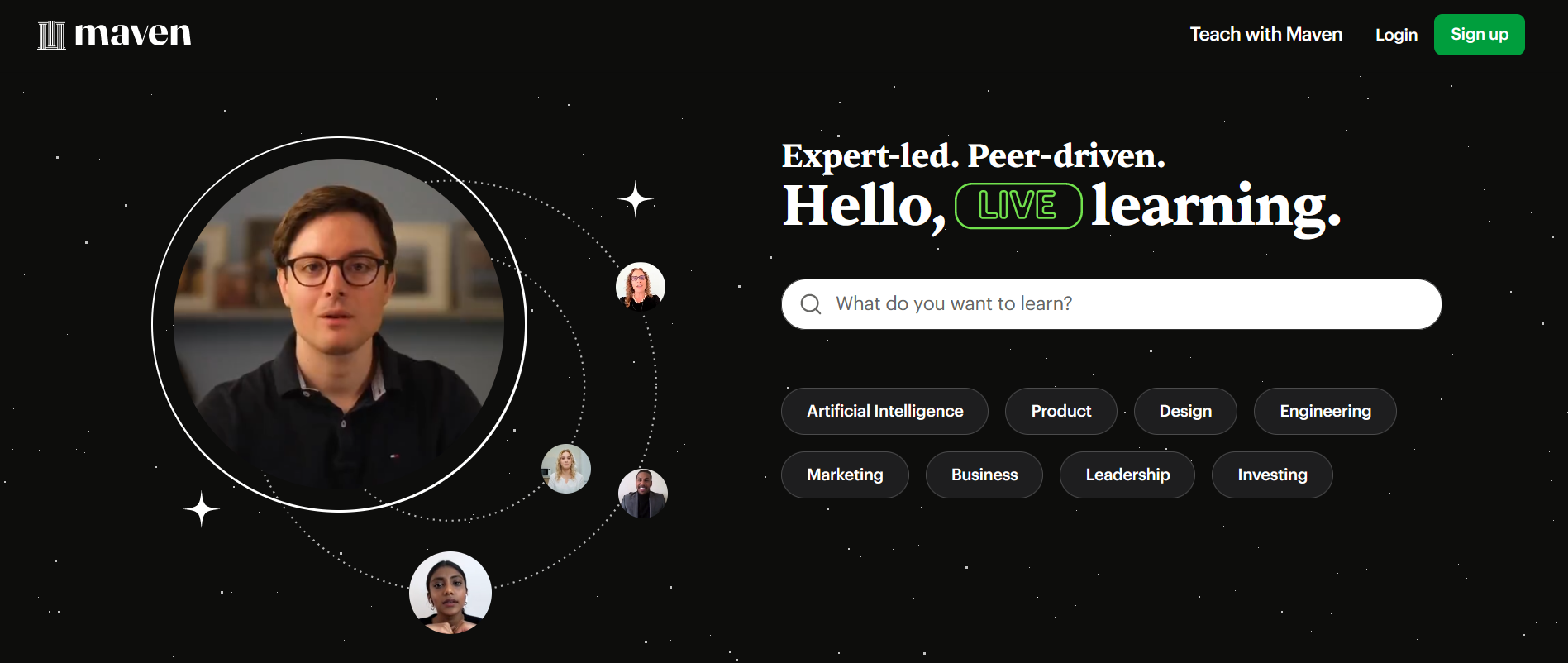
Maven overview
Pros
Unique learning platform that curates courses from experts.
Potentially higher margins from a live course and better engagement for students.
Lots of support if you're selected and your course is listed in a course catalog.
Cons
You need to apply and be selected.
All the same problems of a marketplace apply: Maven owns the customers and keeps 10% of your revenue.
Pricing
Maven keeps 10% of your revenue
5. ClickFunnels
Best Kajabi marketing alternative
ClickFunnels is a marketing platform, not a course platform. So if you're interested in Kajabi's course marketing features, ClickFunnels is a good alternative. It gives users pre-built sales funnels to choose from for selling pretty much anything--including a course funnel.
ClickFunnels overview
Pros
Tons of research-based sales funnels from a company that focuses ONLY on selling stuff.
It's easy to use: quickly build landing pages, add upsells, connect emails, etc.
Cons
It's expensive and you can't deliver a product directly. It would need to be paired with a course platform.
Pricing
Starts from $127/mo
6. Udemy
Best course marketplace alternative
For course creators who want to host their course on a marketplace, Udemy is a good alternative to Kajabi. Course marketplaces give you a very specific trade-off: they take a portion of creators' earnings in exchange for having your course listed on their marketplace. They do all the hosting, you list for free, and you get exposure and their audience, but no customization or ownership. And you usually earn less.
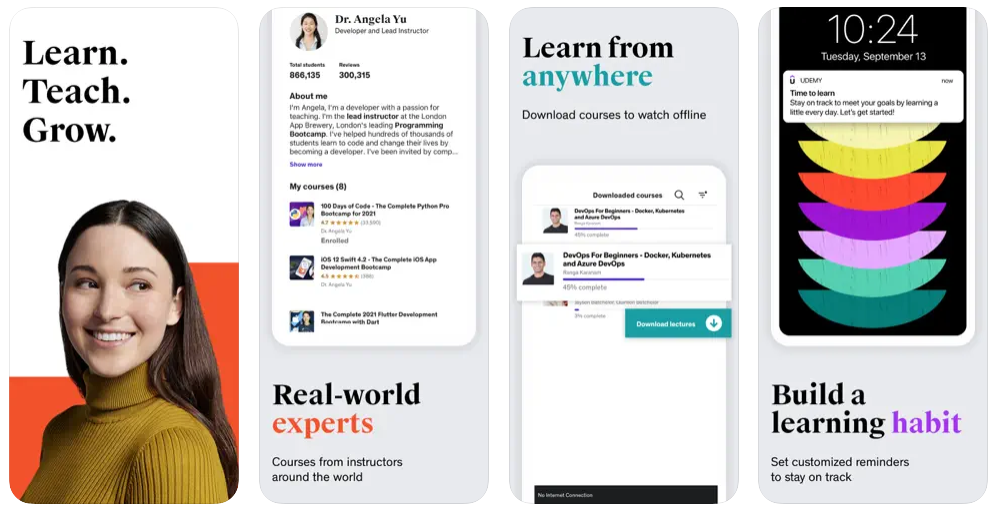
If you decide you want to go this route, Udemy is one of the better Kajabi alternatives for an asynchronous course.
It has a decent creator payout model: you keep 97% of the revenue you bring to the platform (e.g. through direct links). But you only keep 37% of revenue from students who find you on Udemy.
Udemy doesn't put many restrictions on who can teach, and they let you set your own pricing (from free to $299).
You can choose to have your course boosted in Udemy promotions (although they also reserve the right to cut your price).
Udemy doesn't require any upfront payment on your part, they take it all out of the back-end earnings. But Udemy has 64 million students and 210,000 courses. So like any course marketplace, there are lots of potential students but it can be tough to be seen.
Udemy overview
Pros
Course marketplace with tons of existing users to (potentially) find your course.
No upfront payment, customer support, design, or customization work. Udemy handles it all.
Fairly flexible monetization models with options for direct sales.
Cons
You're fighting for attention among 210,000 courses.
Udemy takes a good chunk of your revenue.
You don't own the customers, ever. You're building Udemy's business.
You get zero engagement options and no live teaching. There's only one way to teach on Udemy.
Pricing
Udemy takes 3% or 63% of your revenue, depending on how students find your course.
7. Thinkific
Another alternative to Kajabi to consider if you’re looking to create online courses is Thinkific. Thinkific is a course platform that also does website building, and has other digital product options.
Creators and digital entrepreneurs can create a wide range of content types for their online courses including quizzes, multimedia-based articles, videos, surveys, webinars, and more. And Thinkific has some automation tools which make onboarding students and sending mass emails much easier.
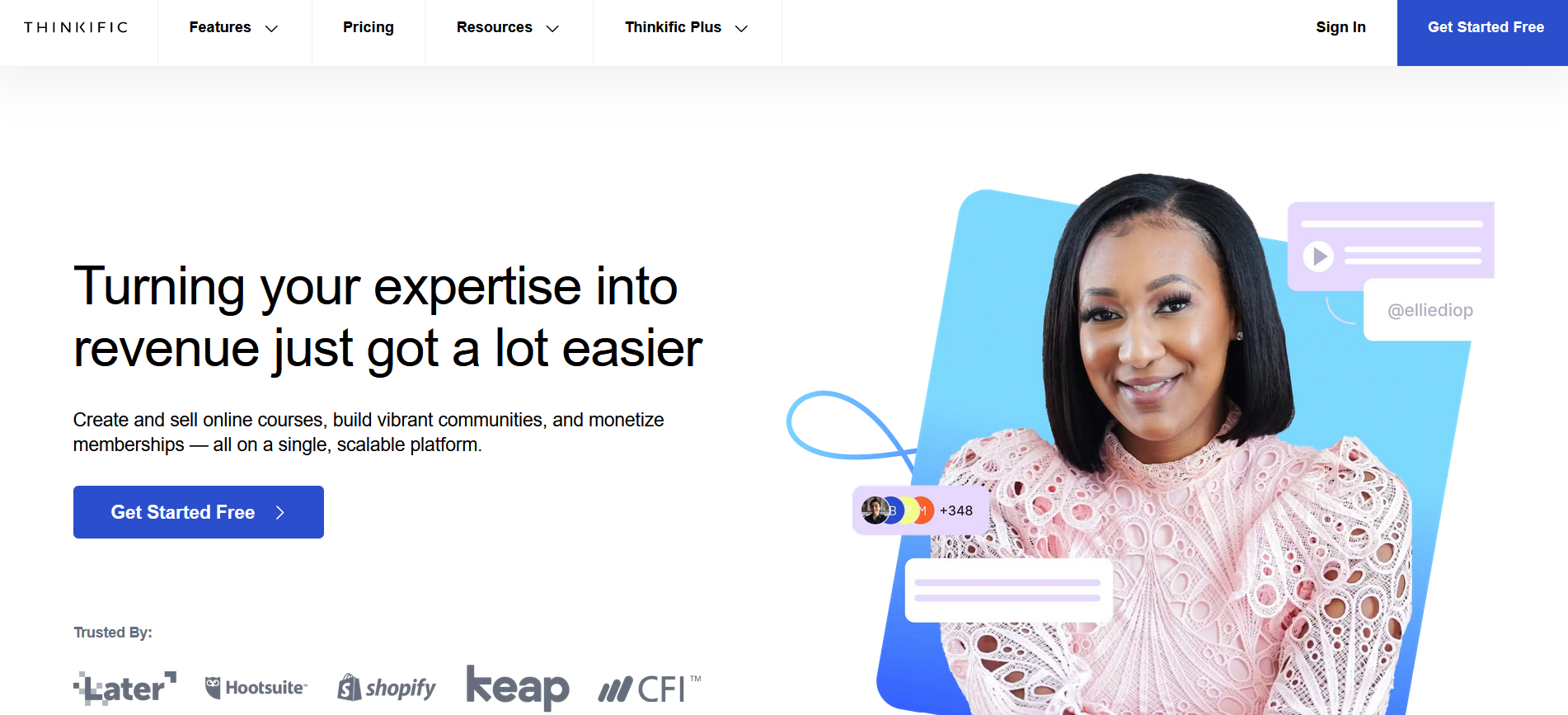
Thinkific is also much cheaper to get started. It lets you start for free, learn the basics, and then start paying when you’re ready to get your courses in gear.
Thinkific has a basic native email. But it's missing community tools for comprehensive engagement and and fostering a learning community, and it doesn't have native livestreaming--meaning a cohort course can only happen on Zoom.
And Thinkific's apps are pretty new and have been plagued with glitches and low ratings.
Thinkific overview
Pros
Good LMS with lots of options for an async course and flexible delivery.
Drag-and-drop website builder with lots of templates and sales pages to choose from.
Some Kajabi-style marketing tools like basic email, coupons, an affiliate program, etc.
Cons
It's missing native livestreaming (for cohort courses) and built-in engagement and community features.
The apps were only recently launched and have terrible reviews.
Pricing
Starts from a free plan, then $39-$399/mo
8. Teachable
Best-known Kajabi alternative
Teachable has all the features you need to create async courses, enroll students, and collect payments. It doesn’t have integrated email nor does it offer the same kinds of complex marketing features Kajabi is known for. And like Kajabi, it doesn’t have a good option for creating an online community. But it is a common alternative.
Now, it should be said that a lot of instructors start off on Teachable) for their early online courses and tend to upgrade to Kajabi once they are successful. This is because Teachable isn’t as comprehensive as Kajabi.

Teachable also only has an iOS app, which is a huge disadvantage for getting your courses to your users, and it lacks the marketing and email functions–which you’d have to pay for elsewhere.
Choosing Teachable means managing more services in different places, but it’s still cheaper and simpler to use than Kajabi. However, it’s definitely not the best Kajabi alternative.
Teachable overview
Pros
Good LMS with comparable content options to the other course platforms on this list
Some built-in marketing features to help sell a course: up- and down-sells, triggers, and an affiliate program
Landing page builder and tons of integrations
Cons
Missing engagement features, discussion forums, events, livestreaming, etc.
It doesn't have a way to teach a live course.
It doesn't have Android apps. And 70% of all mobile users are on an Android device.
Pricing
From $1 + 10% of revenue per sale or $39/mo.
9. Skillshare
Skillshare is an interesting alternative to Kajabi for creators. Like Udemy, Skillshare is a course marketplace. It has a lot of the same features, but it's further down this list for one reason: the payout structure on Skillshare isn't as good.
On Skillshare, you can create online courses, promote them, and grow your audience thanks to the platform’s large pre-existing user base. For some, the pre-recorded nature of Skillshare courses will be more approachable than having to teach “live,” but it’s also a less dynamic experience for your students that way.
Skillshare's downfall is the payment structure. It takes a portion of its membership revenue and divides it among teachers according to watch time. That's fine if you're a celebrity teacher, but if you're new to the platform there's a good chance your course is starting from the bottom--and competing against tons of other courses. It can be hard to earn.
You also need to have a minimum watch time before you can get paid. And even if you monetize, only a few creators will ever earn what their course would be worth on their own platform.
Skillshare overview
Pros
Good course marketplace with high brand recognition.
Well-known for creative courses and could be good for exposure.
The project feature is cool and lets you build real stuff.
Cons
You're struggling to get seen.
It's hard to make money with the payout model.
You have no ownership of your students--they're Skillshare's customers.
Pricing
Free to use but payouts depend on Skillshare's revenue share model.
10. LearnDash
Best WordPress-based Kajabi alternative
A decade ago, many course creators were bloggers who had built a blog on WordPress and wanted to add a course to their offers. This isn't as common anymore. But if this describes you, you might be looking for a Kajabi alternative that's WordPress-specific.
Now, it's important to say this: Just because you have a WordPress blog or site doesn't mean you NEED a WordPress plugin for a course. It's easy to choose any course software on this list and host it as a sub-directory on your site.
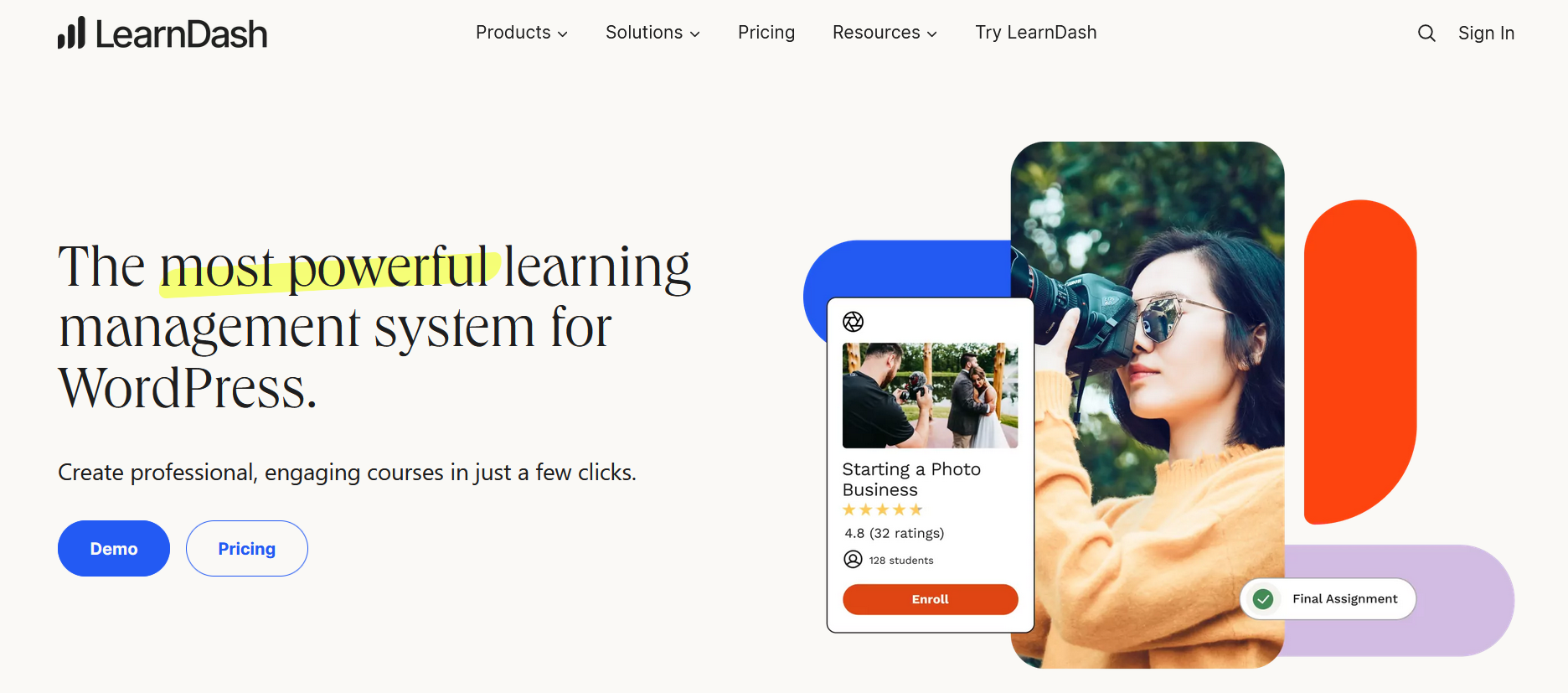
However, if you're determined to go with a WordPress plugin, LearnDash is a good choice. It gives you a course creator that looks like the Gutenberg editor, with lots of course tools and customization to choose from. You have a drag-and-drop course editor, quiz options, and some e-commerce capability (most LearnDash users need a separate payment processing plugin).
LearnDash overview
Pros
LMS plugin for WordPress with an intuitive interface.
Flexible course delivery options with customization features & a drag-and-drop builder.
Badges, quizzes, certificates, and some sales tools.
Cons
Need other plugins for full e-commerce functionality.
WordPress plugins are complicated and often require custom development to look right.
Even with several plugins, you won't get the functionality of a well-designed course platform.
11. WizIQ
WizIQ is an LMS and classroom software that has some useful course-building features, making it a decent Kajabi alternative. It's most commonly used for applications in certain industries like corporate training, government, or higher ed. And it does have quite a corporate feel to the design and UI.
That being said, the LMS is powerful, handling both asynchronous and synchronous learning and MOOC designs. It also has the option to deploy some white labeling under your brand.
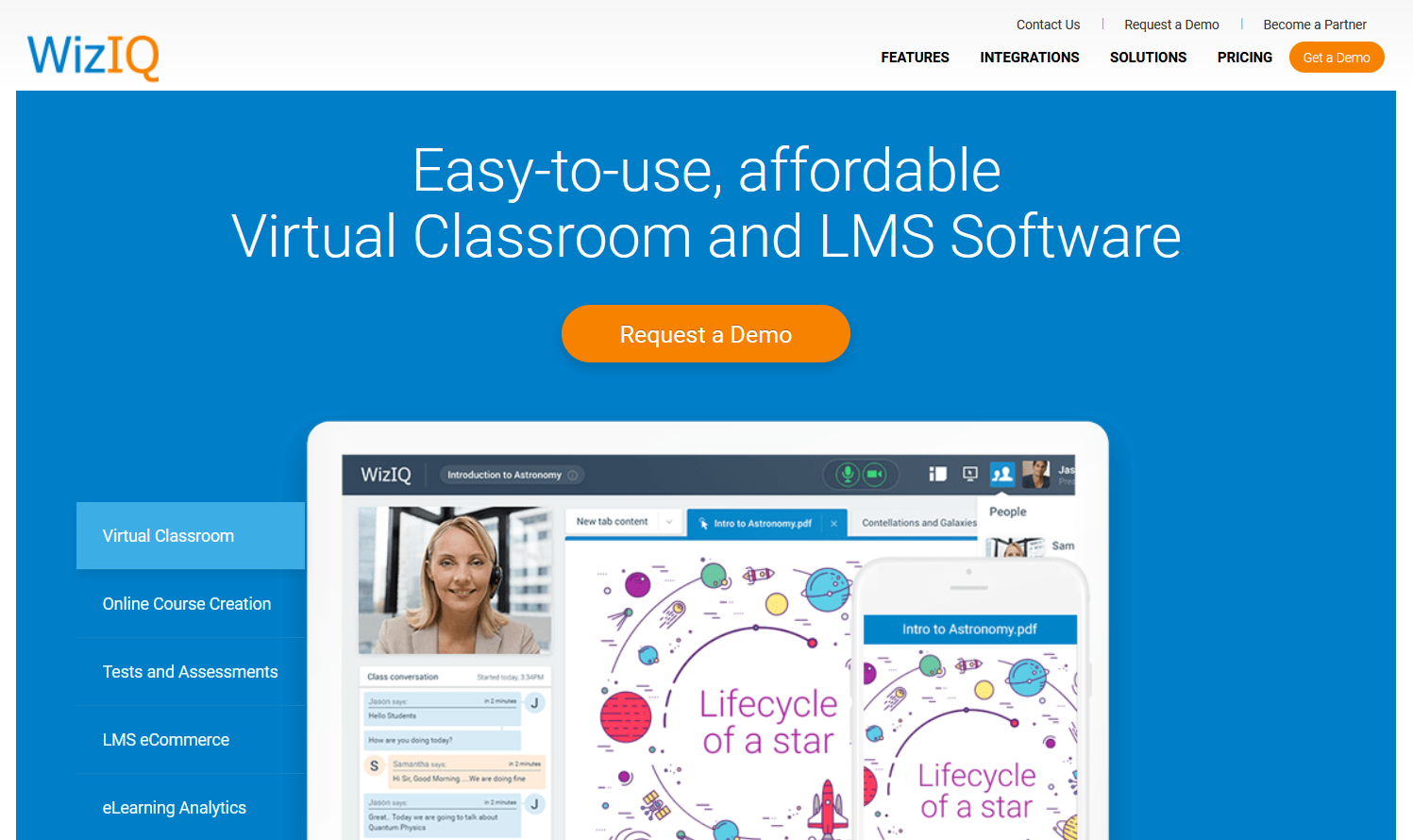
WizIQ overview
Pros
Solid course features: whiteboarding, breakout rooms, native livestreaming, and messaging.
Useful data and analytics tools plus mobile apps for Android and iOS.
Deploy your course under your brand.
Cons
It can get really expensive; as you grow there are more and more costs. It's best for corporate customers because of the price.
It's not self-service. You need to work with the WizIQ team, and there have been complaints about their customer service.
The branding looks corporate.
12. Coursera
Best platform for affiliated teachers
If you're a college or university professor, or you have a senior position at a major company, Coursera is probably a good Kajabi alternative. While it's not open to everyone, Coursera helps people with impressive affiliations get their courses seen.
As a result, students can take courses that have real accreditations built-in (like college degrees). The degree pathways are expensive on Coursera (just like--you know--college), but there are some other options too that are affordable for everyone. And there are some really great free courses.
If you're accepted to teach on Coursera, you get access to a teaching portal that comes with assistance in creating content and training.
Coursera overview
Pros
A marketplace platform with courses from industry and higher-ed leaders
A supportive teaching platform to help teachers run a successful course to the huge user base (129 million people)
Real accreditations from higher ed and companies
Cons
You need to be accepted, and unless you have an impressive affiliation, you won't be.
It's pre-recorded first, missing options for building engagement and live courses.
Pricing
Coursera doesn't make its compensation public
13. Podia
Podia is an interesting alternative to Kajabi because they’ve built a platform that allows for online courses, memberships, and digital projects. It has some similarities to the all-in-one model of Mighty Networks, but they rely heavily on integrations for their platform instead of native features.
On Podia, you can create different kinds of content and offer it all in one digital storefront, so it’s easy to navigate and add new products. Some examples of what you can create are: online courses, digital memberships, one-off webinars, and digital downloads. They also offer solid 24/7 support to help you through your issues as they arise.

All said, Podia feels a bit like a more basic version of Kajabi and it has a similar focus. But as of writing this, Podia seems to be focusing more on its website builder than course platform.
Podia overview
Pros
A drag-and-drop website builder with lots of templates to choose from
The option to include courses or coaching with the website
Some of the same tools Kajabi has for marketing, email, etc.
Cons
The LMS, course tools, email, and marketing are all extremely basic.
No mobile apps
Pricing
Starting from 8% of your revenue
Ready to start?
If you're looking for the best Kajabi alternative to host your online course, come build with Mighty! Host any kind of course you want, whether cohort and/or async. Connect communities, forums, member profiles, events, live streams, and more. It's easy to sell and create bundles, and your network is available on beautiful, native apps for all devices (or even branded apps).
Come try Mighty! It's free for 14 days, no credit card required.
Ready to start building your community?
Start a free 14-day trial to explore Mighty—no credit card required.
More like this
Join Mighty Community
Learn the principles of Community Design™ (and see them in action) alongside thousands of creators and entrepreneurs. It's free to join!

Online Courses
Creating a Course
Teaching a Course
Course Platforms
Selling a Course
Communities & Memberships
Community Platforms
Managing a Community
Building a Community
Growing a Community
Monetizing a Community
Content Creation
Creators & Entrepreneurs
Monetization
Content Creation
Starting a Business
Website Builders
Creating & Managing a Website
Events
Event Platforms
Hosting & Marketing Events
Branded Apps
Creating a Mobile App
Coaching Apps
Community Apps
Coaching
Mastermind Groups
Starting a Coaching Business
Coaching Platforms
Filter by Category
Online Courses
Communities & Memberships
Creators & Entrepreneurs
Events
Branded Apps
Coaching
Start your free trial
14 Days. No Credit Card Required.





















